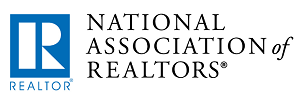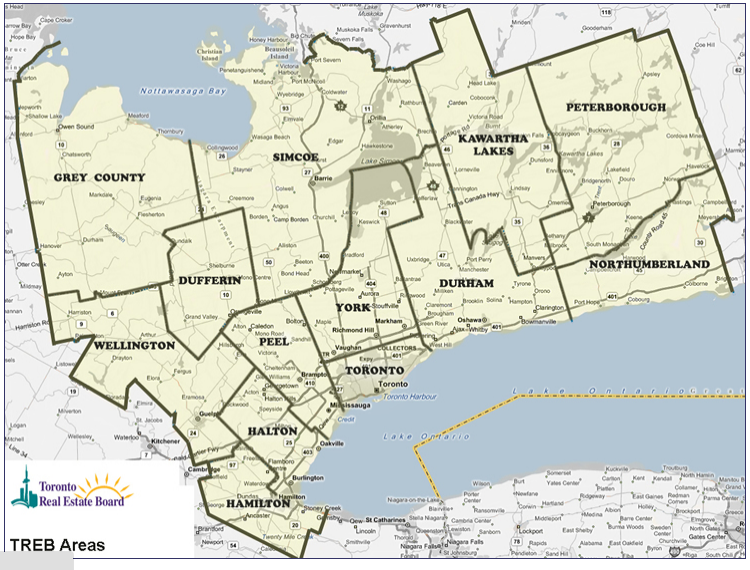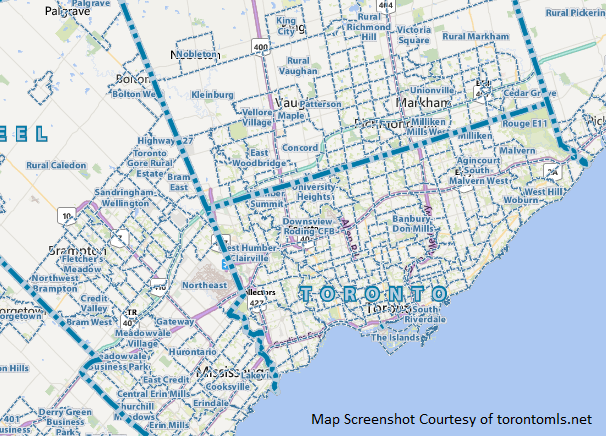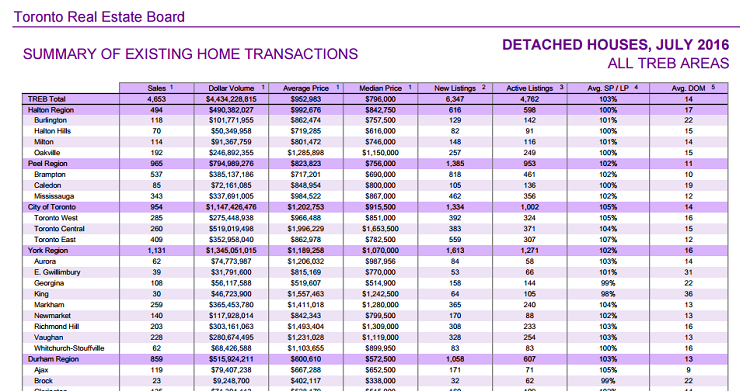MLS Real Estate Listings – NAR CREA – TREB Homes Condos for Sale
What is the MLS?
MLS is the term you often see used on realtor’s websites casually or formally. It’s also referred to frequently in housing forecasts and Realtor sales reports. The multiple listing service or MLS is essentially a database of homes for sale. In the US, the National Real Estate Association owns the rights to the term and in Canada, including Toronto, the MLS® is a registered trademark of the Canadian real estate association.
 NAR and CREA consider both the acronym MLS® and the information collected in the MLS database as their sole proprietary asset as are the terms Realtor®, Realtors® and Multiple Listing Service® as well as the Realtor.com and Realtor.ca websites.
NAR and CREA consider both the acronym MLS® and the information collected in the MLS database as their sole proprietary asset as are the terms Realtor®, Realtors® and Multiple Listing Service® as well as the Realtor.com and Realtor.ca websites.
The governments in the US and Canada have a different view of that information and who is the legal owner. CREA in Canada and NAR is the US are the respective organizations who own the trademarks and MLS databases. They are associations of trained and accredited professional realtors. CREA and NAR member associations designed and built their respective MLS databases as a private collection of information for their members and for national members. There is quite a bit of cooperation between US and Canadian associations because of national real estate brokers such as Remax, Century 21, Royal Lepage, Coldwell Banker, and others.
NAR – The National Association of Realtors in the US
 NAR or the National Association of Realtors is owned by a private company headquartered in Chicago. It is a self regulatory organization of 1.1 million members who are either Brokers or Realtor associates. NAR governs the hundreds of local Multiple Listing Services (MLSs) which are the information exchanges used across the nation by real estate brokers.
NAR or the National Association of Realtors is owned by a private company headquartered in Chicago. It is a self regulatory organization of 1.1 million members who are either Brokers or Realtor associates. NAR governs the hundreds of local Multiple Listing Services (MLSs) which are the information exchanges used across the nation by real estate brokers.
After being charged by the US department of Justice for antitrust activities, NAR responded by proposing a single Internet Listing Display system that allows its members to exclude individual brokers (whether of a bricks-and-mortar type or solely internet-based) and opt out of display on all other brokers‘ sites. In Canada, there is a similar agreement.
 Recently, Canada’s competition bureau ruled against TREB several times with respect to anti-competitive activities. It seems TREB and CREA want to favour their members and retain their monopoly on the MLS data. As you may know, a monopoly is one of the most cherished goals of any free enterprise business. When you have monopoly, you can set the rules and charge whatever you want for your product and services. Microsoft and Google are two other organizations that have possessed almost monopolistic power and it worked very well for them. No anti-competitive charges have been laid against Google.
Recently, Canada’s competition bureau ruled against TREB several times with respect to anti-competitive activities. It seems TREB and CREA want to favour their members and retain their monopoly on the MLS data. As you may know, a monopoly is one of the most cherished goals of any free enterprise business. When you have monopoly, you can set the rules and charge whatever you want for your product and services. Microsoft and Google are two other organizations that have possessed almost monopolistic power and it worked very well for them. No anti-competitive charges have been laid against Google.
Most of us would uphold the right of a company to own their products including a database and charge whatever the market will bear. Sort of like how Miami, Boston, New York, Vancouver, Los Angeles, San Diego, San Francisco, San Jose, Seattle, Dallas and Toronto realty markets are going right now.
Others believe that this type of monopoly is unfair to consumers who may be forced to buy services they don’t really want or need. The Internet has imposed itself on the real estate industry and consumers are doing more of the real estate buying process themselves. Realtors are sought for their added value as expert consultants.
CREA has not accepted or updated their view of the situation, yet CREA does want to claim to be a governing, ruling body of authority with respect to who practices real estate and to enforce that through local town bylaws and licensing regulations. All of a sudden, free market ideology isn’t quite being realized here. Without the formation of a competitive alternative, the government can claim an unfair monopoly for CREA and seek to rectify it or punish CREA for its behaviour, and it is doing so.
Canadian MLS
There are a number of MLS’s across Canada, BC, Alberta, Quebec, and Ontario. The Toronto Real Estate Board controls the Toronto MLS district which is known as the TREB MLS system which includes properties in Toronto, Mississauga, Oakville, Scarborough, Vaughan, Markham, Brampton, Richmond Hill, Aurora, Newmarket, Oshawa, and Etobicoke.
Each licensed and qualified realtor in the TREB district can obtain a datafeed of the Toronto MLS for a monthly database usage feel. That list of properties and its details are then presented on the realtor or agent’s website and you can search their listings for homes and condos for sale.
Competitors of the MLS’s include Zillow, Zoocasa, and Trulia. These organizations are generally not liked because they threaten the MLS and the status of realtors across North America. Realtors® often talk disparagingly about these services including complaints about their method of estimating the value of a home.
The truth of this might be that we’re in between a rock and a hard place. CREA’s power to own home sales data across Canada is coming to an end. They can only delay the inevitable, and the more they resist, the stronger new competitors will be in building their business to compete with CREA. The battle continues.
MLS Property Details and Homes for Sale
When you do a search for a home using the MLS system you won’t see all the information a realtor sees. They have access to extra information such as old listing prices and previous selling prices. If the sale happens on the free market, then knowledge of old selling prices isn’t all that meaningful anyway. What a property was evaluated, listed at, or sold at 5 years ago, has little relevance in today’s fast rising market.
As you can see in this map of TREB areas below, TREB MLS coverage is large and actually encompasses other mls associations. Other Ontario real estate boards having their own MLS’s include the REALTORS® Association of Hamilton-Burlington, London St. Thomas Association of Realtors, Niagara Association of REALTORS and many others.

Toronto MLS Districts
TREB MLS coverage includes Mississauga, Markham, Richmond Hill, Brampton, Scarborough and Oshawa. The graphic below delineates the TREB mls districts (small blue rectangular areas) in its purview.

You can learn more about home selling prices in each MLS district on the Toronto Real Estate board website were you’ll find their monthly reports. Some like these give you a breakdown of homesale in each area, and home much they are typically sold above asking price.

What can we say in final comments about the Toronto MLS? That it’s a handy listing of homes and condos for sale, and a valuable repository of information about a specific property’s details and history which buyers will be interested in knowing should they be willing to buy that home or condo. Homes hold many dark secrets and sometimes buyers are left with a bad financial surprise revealed later. If you’ve bought such a home, you can seek redress in the courts if it looks like the seller should have revealed it.
After you’ve done your initial perusing of the Toronto MLS home listings, find a trustworthy realtor who has the ability to market your home to as many home hunters as possible. Your goal as a home seller is to get the best price for your huge investment. That’s what your home is — an investment and one day you will sell it.
Important Real Estate Posts: SEO for Real Estate Agents | Real Estate Tips | Toronto Real Estate SEO | Los Angeles Real Estate SEO | San Diego Real Estate SEO | Boston Real Estate SEO | Real Estate Leads | Real Estate Marketing | Housing Forecast | Vancouver Real Estate Marketing | Real Estate Bloggers | Social Media for Realtors | Sell Your Home | Real Estate Investing | San Francisco SEO | Predictive Analytics and Prospecting | Creative Ways to Get Leads | Aurora Newmarket Real Estate Forecast | Zillow Leads Program
